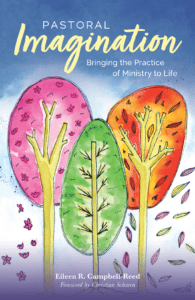Ongoing social and political upheavals intensified by the COVID-19 pandemic have presented clergy with challenges that will require more than rational brain power to solve, said Baptist minister and author Eileen Campbell-Reed.
In her new book, Pastoral Imagination: Bringing the Practice of Ministry to Life, Campbell-Reed sets out to demonstrate how pastors, chaplains and other ministers can tap into personal experience, intuition and wisdom to more effectively lead through seismic shifts in culture and church and through the struggles of day-to-day ministry.
“This is about a kind of learning that we do all the time, but we don’t always recognize or cultivate. Pastoral imagination is about learning an embodied, relational, integrated and spiritual knowing of how to do the work of ministry,” said Campbell-Reed, visiting associate professor of pastoral theology and care at Union Theological Seminary in New York City and a former spiritual formation consultant for the Cooperative Baptist Fellowship.
 Learning to connect with the insight accrued through time and experience eventually blossoms into a deepened pastoral understanding and imagination, she said. And that process is not honed by study, but from a knowing cultivated through practice.
Learning to connect with the insight accrued through time and experience eventually blossoms into a deepened pastoral understanding and imagination, she said. And that process is not honed by study, but from a knowing cultivated through practice.
“People learn how to play instruments, play sports, play games, cook, drive and ride bicycles by doing — by practicing — not primarily by thinking. Yet we all too often treat ministry as something we are going to learn by thinking about it.”
The idea of pastoral imagination will be nothing new to anyone familiar with Campbell-Reed. She is co-director of the Learning Pastoral Imagination Project, a grant-funded, longitudinal study of the spiritual and professional development of 50 U.S. clergy for more than a decade.
Members of the cohort have been tracked since seminary and provided mentoring and spiritual formation to help them cultivate and engage the tools of pastoral imagination in their settings.
Periodic interviews with Campbell-Reed and Christian Scharen, her partner in the project, helped document the ministers’ response to life and career events, social, political and racial unrest and the pandemic.
The study has resulted in numerous academic articles geared mostly to fellow academics,” she explained. “But those are not easy to access for everybody else, and I wanted the findings about pastoral imagination to be more accessible.”

Eileen Campbell-Reed
So, in 2018 she launched 3 Minute Ministry Mentor, a weekly blog, podcast and video presentation that combines the telling of ministers’ stories and resources for viewer participation.
3MMM quickly “developed a following of people who are engaging the practice around pastoral imagination. I knew from the beginning it would be a book,” she said.
Like its online predecessor, the book combines stories and questions designed to provide mentoring guidance in 50 chapters with topics such as self-reflection, emotional intelligence, practicing resurrection and failing creatively, she said. “These 50 chapters are like 50 layers of what it is to have and cultivate pastoral imagination – and they are not exhaustive.”
Campbell-Reed described those layers as if they were on an online mapping program where users can choose to see topography, then add local businesses, gas prices, historical landmarks and other features. “Pastoral imagination has all these different dimensions that function like the layers on that map.”
Knowing which layers to see, and when, goes back to the concept that tapping into wisdom is akin to learning to ride a bike.
“The book is based on the idea that something we learn is something we practice,” she said. “The message is: trust your intuition — the sedimented knowing of your body and mind. And that takes time.”
“The book is based on the idea that something we learn is something we practice.”
It also takes help. As she and Scharen do in their pastoral imagination study, Campbell-Reed encourages readers to lean into fellowship to embrace a heightened awareness and wisdom in ministry.
“This capacity for pastoral imagination is not a solo activity. It is so much richer when you have peers and mentors who are in it with you,” she said. “We just need people beside us on this journey of growth. It makes the work of ministry truly communal.”
That is especially needed after 2020 significantly challenged chaplains, pastors and other ministers, whether it was working to comfort COVID-19 victims and their families or having to pivot from in-person to virtual church. Rampant instances of social injustice permeated all spaces, Campbell-Reed said.
“Several chapters in the book get at the burnout that happens when we become isolated or aren’t doing the things that sustain our work,” she said. “Pastoral imagination offers this encompassing sense of how we integrate every aspect of the work we do and how we include ourselves in the care we give.”
Related articles:
Longitudinal study of 50 clergy approaches the 10-year mark
Scholars, study promote ‘pastoral imagination’ in theological education


